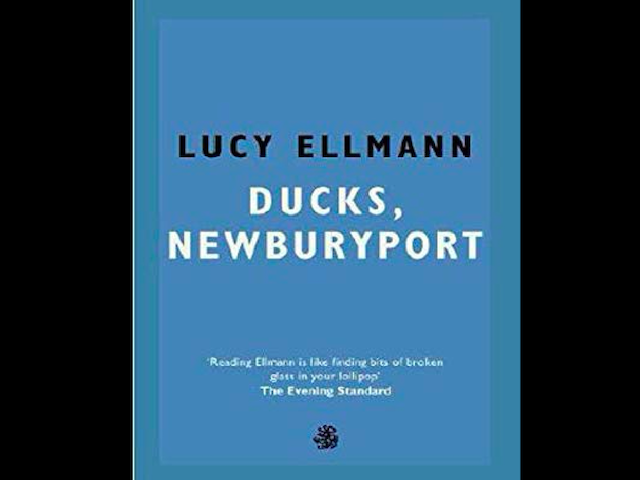Lucy Ellman’s novel “Ducks, Newburyport” was published this month by Galley Beggar Press and has been long listed for the Booker Prize.
This is a book about almost nothing. This is a book about practically everything.
My first encounter with Ducks was via an email from Galley Beggar Press asking if there was anyone out there willing to do a bit of intensive proof-reading for them. They had a book scheduled for publication, nightmare to typeset, system kept on crashing, very tight for time. Yes! I could do that – and I was not the only one. A small posse of us stuck up our hands, rolled up our sleeves.
Oh my! Ducks, Newburyport is a colossus. A doorstop of a book, with nine hundred and ninety pages, plus some appendices. And, ‘Oh, heavens to Betsy’ as Lucy Ellman would put it; apart from a slender but pivotal sub-plot, it is all one sentence. Yup, all one sentence.
I emailed Galley Beggar my first batch of queries and said, ‘I feel like I’m on a runaway train’. ‘Yes’, they said, ‘But do you like it?’
Like it? I grew to love it, like an addict loves junk. The experience of reading it was immersive, compulsive, obsessive. Ducks was my waking thought, I read over breakfast leaving my coffee to go cold, toast untouched. Mid-morning came and went, the dog was unwalked, the house was filthy. I read when I should have been eating, when I should have been sleeping. When I did eventually sleep, Ducks, Newburyport was in my dreams; the lists, the rhythm, cadence, syntax, obsession, syntax, obsession.
So, what is it about? Well, there is a woman in Ohio, happily married, four children, bakes pies, and she worries. She worries a lot. She worries about her family, about contaminated water, President Trump, gun crime, especially school shootings, chickens, historic betrayal and slaughter of Native Americans, bridge disasters, the Amish, neighbours, memory, the contents of her freezer, musicals, types of pie, climate change, health insurance, borrowed books, politics, dogs, clothes that have gone missing, words she doesn’t like, what people must think of her, more chickens, plumbing, preppers, and freak weather. Is the water safe to drink?
Gradually, from this stream, no, deluge, of consciousness, events unfold. Some are banal, some are shocking, and pretty much everything is given equal weight. The variations in pace are largely lexical (and lyrical), the variations in intensity are the province of the reader. It is within the realm of reader-response that the sympathy, empathy, anxiety, breathless anticipation, relief, and solidarity materialise. This character, whose name we do not know, has watched the same films we watch, read the books we read, thought about junk food just like we have. She is brave and funny and modest and apprehensive; she is so absolutely human.
Perhaps the obvious question to ask is, did it have to be that long? Four hundred and twenty thousand words long, making it similar in heft to War and Peace, a byword for wordiness, so wordy we habitually refer to it as ‘weighty’. And I don’t know the answer. But every word in Ducks, feels necessary. Maybe, if anything, there are too few words. There are questions unanswered and loose ends – but such is life. As the book comes to a close, the reader has read exhaustively of the state-of-the-nation, but the nation is still in a state. What happens next?
Just as it invites comparison on length, Ducks, Newburyport will inevitably be measured against other texts that use stream of consciousness or interior monologue: Joyce’s Ulysses, Woolf’s Mrs Dalloway, Becket’s Malone Dies, Salinger’s The Catcher in the Rye, Eggers’ A Heartbreaking Work of Staggering Genius. I believe Ducks, Newburyport will withstand such scrutiny. Not only does Ellman give us the interiority of a fully rounded and complex character, and the volatile leaps of association of uncensored thinking, but crucially, the book is of its time. Ducks sometimes reflects on the past, speculates on the future, but the viewpoint is always firmly rooted in the geo-political-cultural angst of our time.
I have never read anything quite like it. It is a brave book on so many levels: first Lucy Ellman is brave to have written it. Ducks is splendidly idiosyncratic, totally uncompromising in its scope, and excruciatingly honest about the insecurities and frailties, and failings of our species. It exposes the human condition, not from some lofty philosophical standpoint, but from the stove. Secondly, Galley Beggar are brave to take it on and publish; hats off to them for championing such a monumentally original piece of writing. If you decide to read it, make no mistake, you too are taking a brave step. It is a big commitment in terms of the time you will invest to read such a leviathan of human angst. And it is an emotional rollercoaster: it may shake you and drain you. It may change you.
Ducks, Newburyport is Ellman’s eight novel. Previous work includes Sweet Desserts (winner of the Guardian Fiction Prize) Man or Mango? A Lament, and Dot in the Universe.
Jupiter Jones
Jupiter Jones lives in Monmouthshire where she works as a short-order cook in a bikers’ caff. Her writing has been published by Aesthetica, Brittle Star, Earlyworks, Fish, and rejected by many, many others. She is the winner of the Colm Tóibín International Short Story Prize (2018) and is currently working on a bestiary of short fictions.

